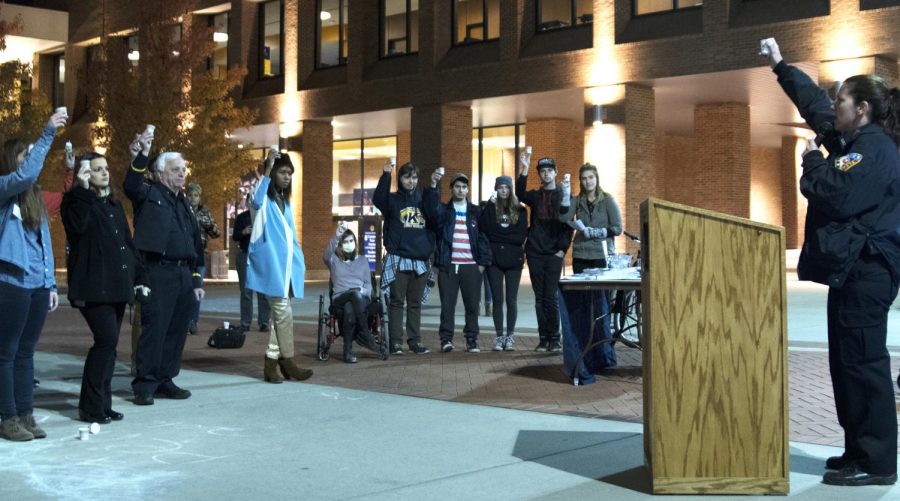‘Rise up to Heroin’ vigil raises awareness
Kent State community members gathers at the “Rise up to Heroin/Opiate Addiction” vigil on Risman Plaza on Tuesday, Oct. 25, 2016, holding up their “candles” at the end of Community Resource Officer Tricia Knoles’ speech.
October 25, 2016
Kent State community members gathered on Risman Plaza Tuesday evening for a “Rise Up to Heroin/Opiate Addiction,”candlelight vigil
Prior to the event, students were invited to chalk the K and bring awareness to the current heroin and opioid epidemic.
“Addiction happens because we aren’t connecting,” said Maureen Keating, a chemical dependency counselor at University Health Services.
Speaking at the candlelight vigil was one of Keating’s methods of trying to connect students with the proper resources to get help as well as how to use those resources.
Keating, along with other Kent State staff and a community member, took the stand and spoke about addiction. Among the speakers were Community Resource Officer Tricia Knoles, Keating and recovering addict and peer support specialist, Sean Cleland.
The Kent State University Police Services, Portage County Health Department, Kent State’s Psychological Services and Kent State’s Office of Health Promotions helped organize the event.
The main reason for putting on this event was to help in spreading awareness, that (heroin) is “affecting everybody, in every category, in every class,” Knoles said.
One of those affected was Cleland, who is still pursuing his degree off and on and Kent State. He is now a recovery coach at Coleman Professional Services, an organization that treats substance use disorders. Stating that his life experience has led him to his current job.
“The stigma around (addiction) is manufactured. There wouldn’t be stigma if we didn’t manufacture it. Breaking that down … you might not be the person’s savior,” Cleland said. “But you can be the person that helps them walk into a door somewhere that gets them the help they need.”
Looking into the crowd, Cleland said, “You all have something important to offer to somebody else that is going through it or will go through it, so the number one thing as far as addiction is, look out for each other.”
He said that his main reason behind speaking was to help people to find one of the many pathways available to them, and to spread the message that “recovery is possible.”
Students said they felt the event had a positive message.
“I wish more people would have been here,” said Edward Baker, a junior biology major.
Samantha Melius, a representative from Students for Sensible Drug Policy and a senior conservation biology major, said, “Even if you don’t know someone personally, you know someone who knows someone being affected.”
At the end of the vigil, Knoles asked the crowd to raise their candles in honor of spreading awareness and to “rise up against heroin.”
“We will rise up and we will find out how to end this crisis that is affecting everyone,” said Randy Davis, a senior chemistry major.
For more information on how to get help, visit the Kent State University Health Services website.
Madeline Zupko is a general assignment reporter, contact her at [email protected].

























